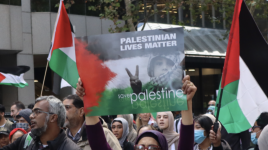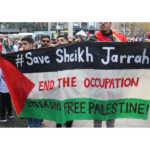Apartheid Israel Can Now Revoke Palestinians’ Citizenship

In a 21 July decision, the Israeli Supreme Court found that the nation’s interior minister may strip the citizenship of a person who has engaged in crimes that constitute a “breach of loyalty”, which does not bode well for Palestinian citizens living in the apartheid Middle Eastern state.
The case involved an appeal by Alaa Zayoud, who had his citizenship revoked by former Israeli minister of the interior Aryeh Deri in 2017, with the approval of Haifa District Court, after the Palestinian man ran his car into a bus station and stabbed three Israelis in October 2015.
The decision was based on Israel’s 2008 citizenship law, which allows denaturalisation when loyalty has been breached, which the authorities interpret based on the nation’s counterterrorism law, which permits the classification of various offences as being terrorist in nature.
On appeal, it was found that there were no constitutional provisions that prevented the stripping of citizenship on these grounds, and the argument that this practice was “selective or discriminatory” as it specifically targets Palestinian citizens was rejected because it can be applied to Jewish Israelis.
Routine denaturalisation
The Palestinian citizens of Israel are known as 48 Palestinians, as they or their forbears, were living within its borders at the time the nation was founded in 1948.
Currently, these Palestinian Israeli citizens make up about 20 percent of the state’s population.
As UNSW Professor Lana Tatour warned in her recent Middle East Eye piece, the precedent set by the Israeli court likely marks “a stepping-stone in Israel’s efforts to advance the ethnic cleansing and expulsion of Palestinians”, so that revoking 48 Palestinians’ citizenship may become routine.
According to Tatour, as a result of the unrest in May last year, 167 Palestinian citizens of Israel, who’d been involved in demonstrations, were later charged with terrorism offences, which means following the recent court decision, they could have their citizenship stripped.
Israeli Supreme Court Chief Justice Esther Hayut outlined in her ruling that the revoking of citizenship can go ahead regardless of whether it renders a subject stateless, as they can then be granted either a permanent Israeli resident status or “another designated status”.
An apartheid regime
Amnesty International declared Israel an apartheid state last February. At that time, the human rights organisation released its report into the matter, which provides 280 pages of evidence to support its conclusion.
The release of the Israel’s Apartheid Against Palestinians report came eight months after Israel pounded the Gaza Strip during an eleven day aerial assault ending on 23 May last year, which saw 248 Palestinians killed, a quarter of whom were children.
This followed attacks upon Palestinians living within Israel’s borders at the site of the al-Aqsa Mosque.
The conflict yet again flared-up over the last weekend, when Israeli forces unleashed a series of attacks upon Gaza commencing on 5 August. A ceasefire had been brokered by Sunday evening, but not before Israeli forces had taken the lives of 43 Palestinians, including six children.







